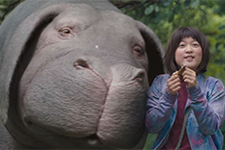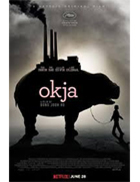Okja
|  I have only seen a handful of South Korean writer-director Joon-ho Bong’s films, and what I have appreciated about each of them is the way he threads a genuine social conscience into familiar genre material amid of a flux of regularly shifting emotional registers. His latest, Okja, is very much in that vein, as it uses a science fiction template to explore issues of animal exploitation, corporate malfeasance, and radical activism in ways that are funny, disarming, heartening, and sad. If you randomly skipped all around the film without having seen it in its entirety, you might think that you’re watching snippets from half a dozen different films—a coming-of-age animal drama, a wacky comedy, an action thriller, a horror film—but the way Bong draws it all together is almost alchemic; it shouldn’t work, but somehow it does. The story takes place in a familiar-looking near-future in which a massive multinational corporation known as Mirando claims to have discovered a new breed of “super-pig,” which they actually created out of genetic mutation. These super-pigs are about the size of a minivan and look like a cross between a pig and a hippopotamus. The corporation’s CEO, the toothy, energetic Lucy (Tilda Swinton), inherited the company from her father (who she openly admits was a sociopath) and has recently taken its reins from her twin sister, Nancy (also played by Swinton), who is decidedly colder in demeanor. Lucy knows that the genetic engineering and mass production of a new animal food source might not go down well with the buying public, so she hatches a massive, gleeful PR campaign that involves a 10-year plan in which 26 of these super-pigs will be shipped around the world to be raised by different people in different environments, with an international pageant to be held after the decade has passed to crown the best of them. The story focuses on a South Korean girl named Mija (An Seo Hyun), whose grandfather received one of the super-pigs. Named Okja, the super-pig has become Mija’s constant companion, loping along with her in the verdant countryside like a giant dog. When Okja is declared the best of the super-pigs by Johnny Wilcox (Jake Gyllenhaal), a grotesquely leering Mirando spokesperson in the guise of a manic TV-ready zoologist, Mija finds herself caught in a pitched battle between the giant corporation’s aim of using Okja and her thousands of brethren as a new food source and the attempts by a group known as the Animal Liberation Front (ALF) to expose Mirando’s fraudulent claims and abusive practices. ALF is led by a soft-spoken young man named Jay (Paul Dano), who is completely dedicated to nonviolence, even though ALF’s methods often involve seemingly violent activities like hijacking trucks (although they always stop short of actually hurting anyone). They need Mija and Okja as part of an elaborate plan to sneak a surveillance system into Mirando’s secretive inner workings to show the world the horrors that transpire behind closed doors, a plan that requires that Okja will be put at serious risk. Bong, who co-wrote the screenplay with Jon Ronson, the Welsh gonzo journalist who wrote the book on which The Men Who Stare at Goats (2009) was based, is clearly invested in the realities of how animals are treated in the bottom-line world of industrialized food production. Okja, despite her physical enormity, is a gentle, personable creature to whom Mija relates with great emotional connection, and the film’s true horror is how she and all the other super-pigs (and, by proxy, all animals that are turned into food) are treated as little more than commodities. Bong doesn’t hold back from depicting what happens in industrial animal farming, with Okja eventually being forced to mate with another super-pig and having part of her flesh cut out for a taste test. Despite being played like a frantic human cartoon, Gyllenhaal’s Johnny Wilcox is the film’s most insistent villain if only because he betrays his scientific interest in animals by using it to enable corporate animal torment. The film’s most distressing sequence taken place deep within Mirando’s animal farm, where we see thousands of super-pigs crowded into pens that resemble a concentration camp and being taken one by one to the slaughter. There is a moral heaviness to Okja, as it will likely make even the most determined and unapologetic of meat eaters (myself included) think twice about how that slice of bacon ended up on their plates. Okja is a revealing look at current realities dressed up in the guise of near-future science fiction, and Bong works virtually every emotional register, driving home the point that animals deserve better treatment than we are currently giving them. It helps, of course, that Okja is undeniably cute and, in some ways, downright anthropomorphized in all her detailed CGI glory, but Bong never pushes the film into the realm of the saccharine; the animal’s relationship with Mija, who remains a determined innocent of genuine spirit, feels real and earned. The film’s more heart-tugging moments are counterbalanced by both the action sequences (which are often leavened with absurdist humor) and the kind of brutal corporate satire that brings to mind Paul Verhoeven’s Reagan-era RoboCop (1987). Mirando represents all that is awful about corporate greed and the lack of care that the profit motive inherently engenders, but Bong clarifies the obviousness of this theme with the competing approaches represented by Swinton’s twins: In a perfectly timed nod to our current political reality, they are best described as being roughly analogous to Ivanka and Donald Trump: Whereas Lucy uses good public relations and a false air of sincerity and personability to cloud over her noxious business practices, Nancy just puts her cruelty right out there and doesn’t apologize for anything. Regardless of how much lipstick is put on these pigs (not the super-pigs, mind you), the end result is ultimately craven, a point that Okja drives home with no small amount of force. But, as Bong did in his previous socially aware sci-fi film Snowpiercer (2014), he still manages to find a note of hope on which to end the film, albeit without undercutting the reality that even happy endings are often surrounded by death. Copyright © 2017 James Kendrick Thoughts? E-mail James Kendrick All images copyright © Netflix |
Overall Rating: 


 (3.5)
(3.5)


